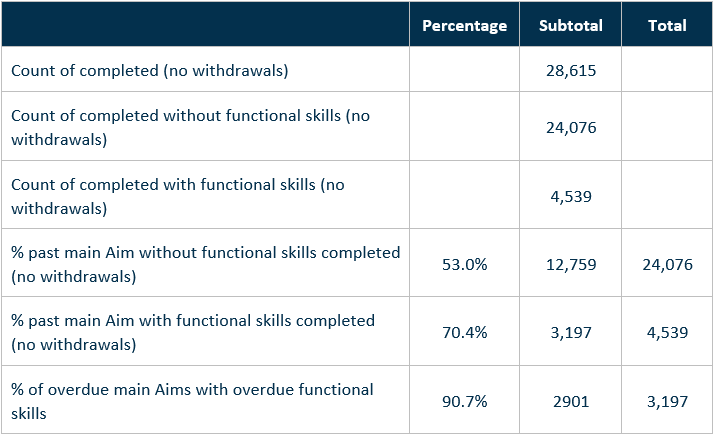Learners on apprenticeship training courses are required to have either achieved a GCSE pass in English and Maths or successfully complete functional skills qualifications in those subjects. The goal is that all apprentices will have the essential literacy and numeracy skills to deal with information, communication and data both at work and in their general life.
A number of training providers and educational media have reported that apprentices are failing because they are struggling to get through functional skills qualifications. This is resulting in overdue programmes, demotivated learners and increased withdrawal rates.
What is the real impact of functional skills Aims on apprenticeship completion rates?
At Aptem we analysed data from over 160,000 apprentice learners who were on programme during the last academic year 2023/24. Our analysis found that learners with functional skills Aims fare less well than those who start their apprenticeship with the required English and Maths qualifications.
Our analysis focused on two groups of apprenticeship learners: those who had (1) completed or withdrawn from learning, and (2) those who were on programme but were overdue on the expected end date for their main aim.
We found that across all apprenticeship levels, more than a quarter (27%) of learners have one or more functional skills components as part of their programme. This includes almost 50% of all level 2 learners, 35% of level 3 learners and 29% of level 4 learners.
Functional skills and delayed progression
Within our data set, we analysed the progress of 112,147 learners who are currently on programme across all apprenticeship levels. We found that almost 25% of these learners were still in learning past their planned end date. Our analysis showed that over a third (34%) of learners with a functional skills component to their programme were behind schedule. These learners were 60% more likely to be behind schedule compared to those not taking a functional skills qualification (21%).

Why is this negatively impacting apprenticeship completion rates?
Two possible explanations are that learners with functional skills needs are at a significant disadvantage in accessing learning materials which causes delay, or alternatively they are struggling with the burden of the functional skills component.
We found that across all current learners, including those overdue on their main programme we found that 63% (20,062 out of 31,847) were specifically overdue on the functional skills components of their programme, which suggests they are not gaining these skills quickly enough to support their main programme aims.
Similarly for learners who had successfully completed their apprenticeship programme, 53% (12,759 from 24,076) of those not taking functional skills over ran past their planned end date. In comparison 70% (3,197 from 4,539) of those with a functional skills aim went past the expected end date, and in 90% of these cases the learner was behind schedule on their functional skills qualification.

Functional skills and drop-out rates
Having identified that learners taking functional skills qualifications are slower to achieve their programme aims, we need to consider whether the impact of functional skills components means that a learner is less likely to finish their apprenticeship. This impacts training providers’ performance metrics and loss of associated achievement payments.
Our analysis found that learners who have a functional skills component are almost twice as likely to drop out. We found that apprenticeship learners with a functional skills need had non-completion rates of 62% compared to 35% of learners who did not.

How can we increase apprenticeship completion rates?
This data highlights the challenges faced by those starting an apprenticeship without the required qualifications in English and Maths. As the new Growth and Skills Levy is debated, cross-sector demand for functional skills qualification reform continues to grow.
Research suggests that many of these learners are likely to have learning difficulties and other barriers which present challenges for successfully completing their apprenticeship programme. Screening tools such as Aptem Assess can help with the identification of previously unknown support needs, and guide the use of effective support strategies to ensure learner success.

